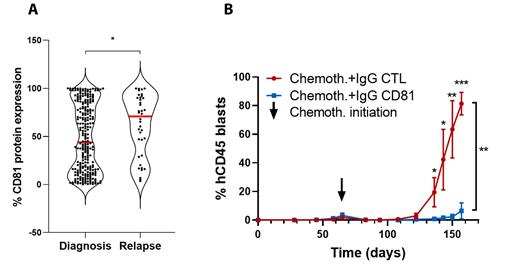Acute myeloid leukemia (AML) is a heterogeneous disease associated with a poor outcome, necessitating aggressive therapies to achieve remission. A major contributing factor to treatment resistance and disease relapse is the presence of leukemic stem cells (LSC). Although challenging, targeting LSC constitutes an imperative approach to improve patient outcomes and limit side effects.
In a previous study, we have uncovered a prognostic association between CD81 cell surface overexpression and worse outcome for AML patients. In the present work, we validated that CD81 overexpression of either protein or mRNA in AML blasts represents a specific prognostic marker for non-CBF AML with an extended cohort (n=150). We then confirmed our data using a publicly available dataset (BeatAML cohort). This association was also verified within NPM1 mutated patients, which was not associated to co- occurring FLT3-ITD mutations.
When further investigating the underlying mechanisms related to CD81 overexpression and its impact on AML progression, we found out that CD81 expression was increased at relapse using paired diagnostic-relapsed samples (19% vs. 67%, P = 0.002). We demonstrated presence of CD81 within the LSC population, defined as CD34+/CD38-/CD90-/CD123+ blasts. Moreover, we showed that the CD81+ LSC fraction was higher at relapse compared to diagnosis (63% vs. 33%, P = 0.0001). In our cohort, non-CBF AML patients with higher level of CD81+LSC had worse outcome (RFS: P = 0.001, HR [95%CI] = 2.01 [1.16-3.48]; OS: P = 0.003; HR [95% CI] = 2.38 [1.32-4.29].
Next, we aimed to explore the potential impact of CD81 expression on LSC function, particularly focusing on its ability to serially engraft in immunocompromised mice (NSG). We observed a positive association between CD81 expression and an increased probability of positive engraftment, and a correlation with time-to-engraftment i.e., faster engraftment of xenografts from AML with high CD81 expression. Ex-vivo drug testing revealed primary AML cells as being more resistant to chemotherapy when engraftment was achieved.
To investigate the mechanisms implied, we engineered either overexpression or knocked-down expression of CD81 in three different AML cell lines using cDNA transfection or shRNA, respectively. By means of these controlled CD81 expression models, we were able to demonstrate that CD81 overexpression increased AML cell adhesion, migration and invasion. Imaging by confocal microscopy exposed the development of membrane protrusions for CD81+ models. In vivo, higher CD81 expression increased blast homing, tumor burden and xenoengraftment efficiency.
Moreover, we demonstrated that higher CD81 expression was linked to chemoresistance to anthracyclines and cytarabine, the two cornerstone drugs commonly used in AML.
Finally, preclinical use of CD81 blocking antibody combined with chemotherapy in xenografts (AML cell line and patient-derived xenografts) resulted in longer relapse-free survival and reduced tumor aggressiveness.
These results highlight the functional significance of CD81 overexpression in AML and its potential role as a biomarker for assessing LSC activity. Further investigations may improve this new avenue for targeted therapeutic intervention aimed at disrupting LSC function and improving treatment outcomes in AML patients.
Disclosures
Cheok:Pfizer: Other: Access to proprietary drug; Jazz Pharma: Other: Access to proprietary drug, Research Funding.


This feature is available to Subscribers Only
Sign In or Create an Account Close Modal